Key takeaways:
- Mentorship fosters personal growth through encouragement, goal-setting, and embracing constructive criticism.
- Embracing mistakes as learning opportunities and engaging with feedback can catalyze significant improvement.
- Regularly tracking progress and reflecting on challenges enhances self-awareness and reveals personal evolution.
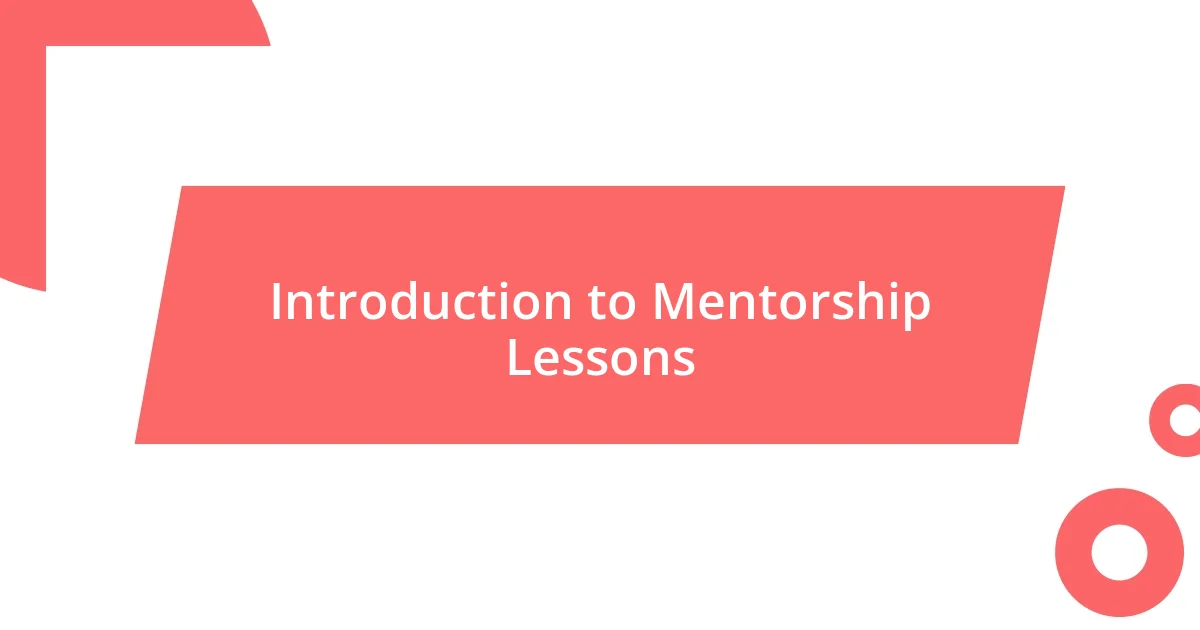
Introduction to Mentorship Lessons
Mentorship is a unique relationship that reveals invaluable lessons through shared experiences. I remember my first mentor, who taught me the importance of perseverance during challenging times; his unwavering support gave me the courage to push through obstacles I once thought insurmountable. Isn’t it fascinating how one person’s belief in us can spark a transformation?
In reflecting on these experiences, I recognize that mentorship goes beyond just guidance; it’s about building confidence and discovering strengths we didn’t know we had. For instance, during a particularly tough project, my mentor encouraged me to take the lead, which ultimately showed me my capability to handle responsibility. Have you ever considered how a few encouraging words can ignite a newfound passion or drive?
Every mentee’s journey is marked by different lessons, whether they are practical skills or insights into personal growth. I once learned from a mentor the power of listening—a deceptively simple trait that changed my communication style for the better. When have you experienced the impact of truly listening versus merely hearing?
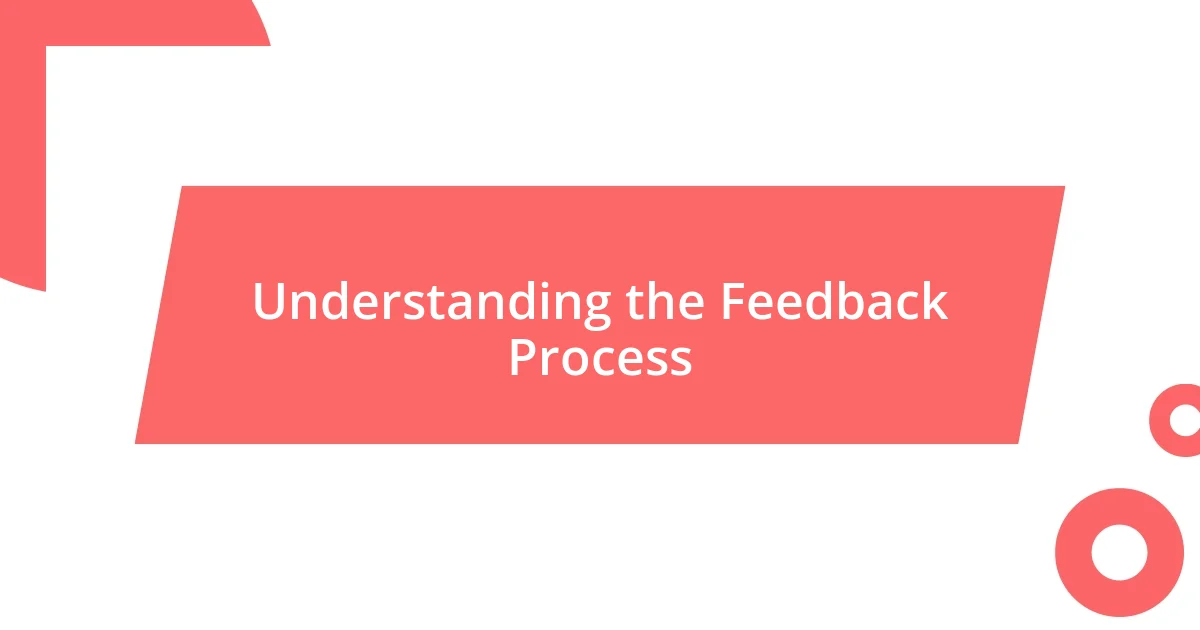
Understanding the Feedback Process
Understanding the feedback process can be a game changer in mentorship. During my own growth, I often found that constructive criticism pushed me further than praise ever could. For example, after a presentation, a mentor once pointed out my tendency to rush through key points. Initially, I felt defensive, but reflecting on this feedback helped me improve my delivery significantly. Embracing feedback isn’t just about receiving it; it’s about internalizing it and using it as a catalyst for change.
To make the most of feedback, consider these steps:
- Stay open-minded: Your initial reaction might be to resist criticism, but try to view it as an opportunity.
- Ask clarifying questions: Engaging in dialogue helps you fully understand the feedback.
- Reflect on the feedback: Take time to think about how you can implement the insights shared with you.
- Track your progress: Keep a journal of how you’ve adapted based on your mentor’s advice to visualize your growth.
- Express gratitude: Acknowledging your mentor’s input fosters a stronger relationship and encourages more open communication.
Every time I applied this approach, I was astonished by how much I learned about myself and my capabilities. It’s like peeling back layers to uncover a more refined version of who you are.

Key Insights from the Review
While reviewing my mentorship experiences, several key insights emerged that shaped my understanding of growth. One of the most profound lessons came from something my mentor once said: “Mistakes are just opportunities in disguise.” This shifted my perspective entirely; instead of viewing failures as setbacks, I started embracing them as integral parts of learning. There’s something liberating about redefining how we see our challenges. Have you ever experienced a moment where a misstep turned into your greatest teacher?
Additionally, the importance of setting goals became exceedingly clear through my mentorship journey. I recall a time when my mentor helped me draft a detailed career roadmap. Together, we broke down larger aspirations into smaller, manageable steps. This not only made my goals feel attainable but also gave me a clear direction. It’s incredible how structuring your ambitions can propel you forward. How often do we think about the impact of clearly defined goals on our motivation?
Finally, the need for continuous learning echoed loudly throughout my mentorship experiences. One mentor particularly instilled in me the idea that education doesn’t stop once formal schooling ends. I remember engaging in various workshops and networking events under their encouragement—this exposure broadened my horizons tremendously. I realized that growth often happens outside of our comfort zones. What educational opportunities have significantly shaped your own journey?
| Insight | Personal Experience |
|---|---|
| Mistakes are Opportunities | Embraced a misstep as a learning moment, leading to significant personal growth. |
| Setting Goals | Collaborated on my career roadmap, breaking larger dreams into actionable steps. |
| Continuous Learning | Attended workshops and events, discovering growth beyond my comfort zone. |
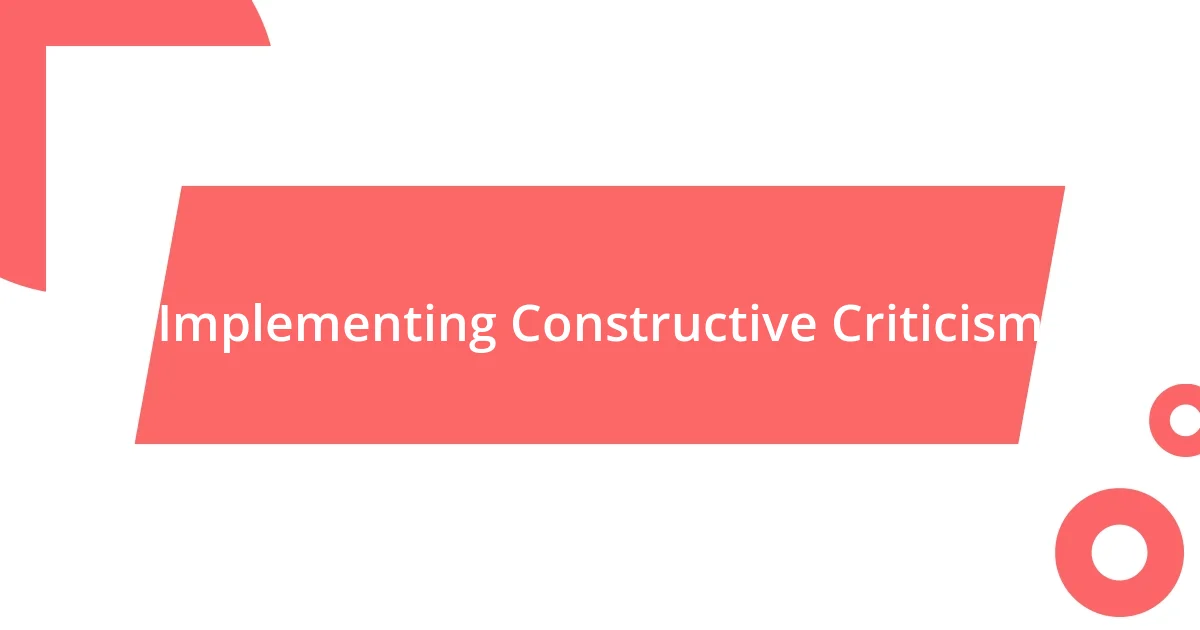
Implementing Constructive Criticism
Implementing constructive criticism can often feel daunting, but I’ve learned to welcome it with open arms. Not long ago, I received feedback on my writing style, which my mentor said was a bit too formal. Initially, I bristled at the suggestion, but I sat down and rewrote a piece with a more conversational tone. The result was stunning—my readers connected much better with the material. Isn’t it fascinating how a little shift can change the entire impact of our work?
One of the most effective strategies I adopted was to actively seek feedback, rather than waiting for it to come. After a project presentation, I started approaching peers and mentors for their thoughts. This proactive approach not only showed my commitment to improvement but also helped me gather diverse perspectives. I remember one mentor saying, “Don’t just accept feedback—embrace it.” That mantra has stuck with me and propelled my growth tremendously.
Additionally, I found that integrating feedback into my daily routine solidified my learning. I began keeping a “feedback journal,” where I listed critiques and my action plans for each. Over time, I noticed a pattern: the same areas of improvement surfaced, highlighting where I truly needed to focus. Ever had one of those moments where a recurring theme in feedback reveals something crucial about your path? I felt like I was finally peeling back the layers of my professional persona, discovering not just my strengths but the growth I deeply craved.
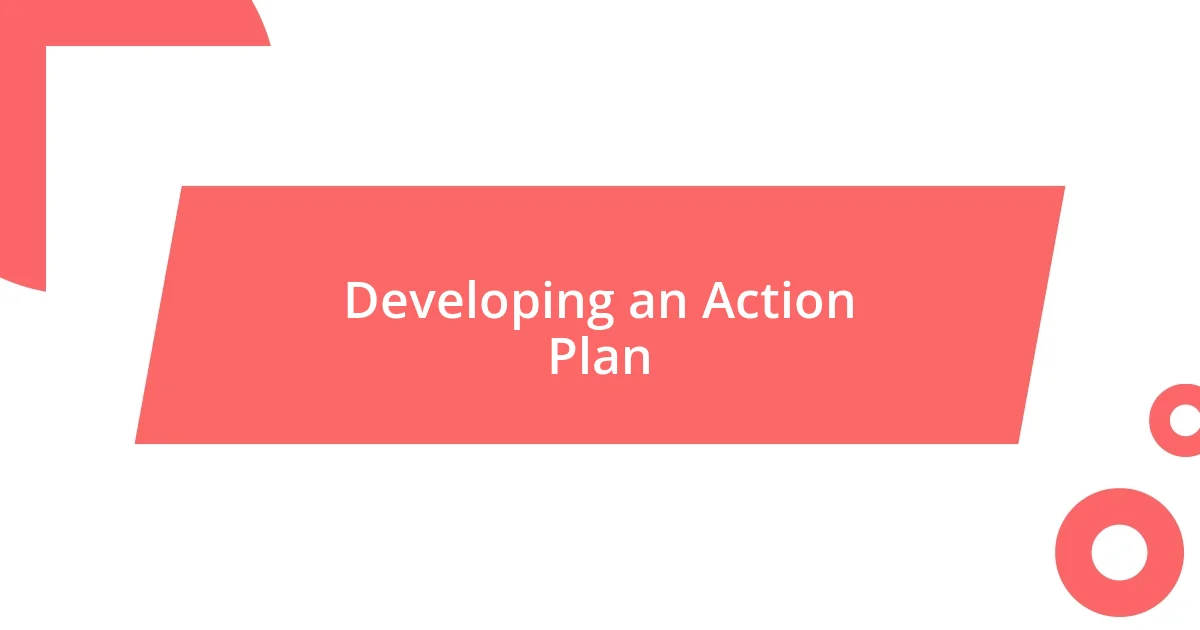
Developing an Action Plan
Creating an action plan is like plotting a course for a journey—without it, you might wander aimlessly. One strategy I employed was to visualize my goals on a timeline. I recall setting aside time one afternoon, coffee in hand, to sketch out where I wanted to be in a year, five years, and even ten years. It was enlightening! I realized that by setting realistic milestones, I turned daunting dreams into achievable steps. Have you ever tried mapping out your aspirations? I found this practice to be a game-changer.
To ensure my action plan was effective, I made it a point to include specific, measurable objectives. Initially, I would simply jot down “improve communication skills.” However, discussing this with a mentor led me to redefine it into actionable items: attend a monthly public speaking club and read at least one communication-related book every month. This shift not only made my goals clearer but also held me accountable. I’m curious, have you ever reconsidered your approach to setting objectives?
Lastly, I learned the importance of periodic reviews of my action plan. Initially, I just set my goals and forgot about them, but I soon discovered that life can change rapidly. I started scheduling quarterly check-ins with myself, evaluating my progress, and adjusting my plans if needed. It felt like giving myself the opportunity to refresh my roadmap—a necessity, really! Each review session brought insights, often revealing unexpected detours in my journey. Have you considered how often reassessing your plan might enhance your growth?
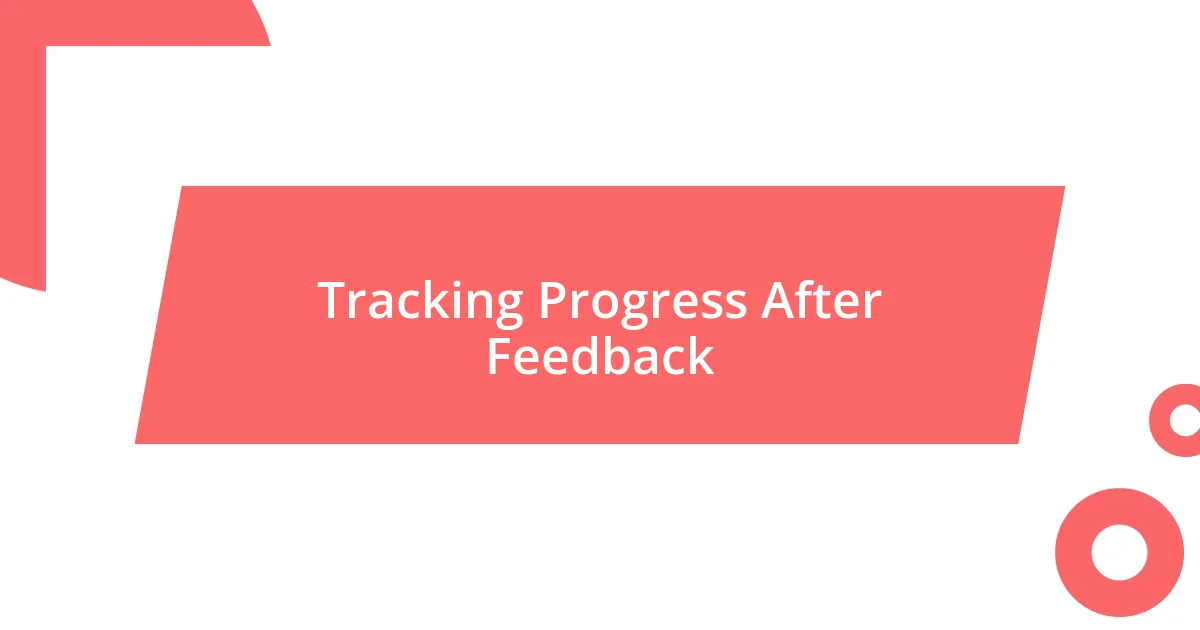
Tracking Progress After Feedback
Tracking progress after receiving feedback is crucial for real growth. I still remember the time I received a thorough critique from a mentor on my presentation skills. She highlighted areas where my anxiety appeared and how it impacted my delivery. It was a tough pill to swallow, but I committed to tracking improvements. I recorded my practice sessions, focusing on posture and vocal clarity, and after a few weeks, I noticed a tangible difference in my confidence and body language. Isn’t it amazing how documenting your journey can illuminate your progress?
Additionally, one of my favorite methods involved creating a tracking spreadsheet. I divided it into three sections: feedback received, action taken, and results observed. This exercise didn’t just feel like work; it became a source of motivation. Each checkmark I added showed tangible growth, fueling my desire to keep improving. Have you ever found that visualizing your progress can spark even more enthusiasm?
After significant feedback sessions, I began discussing my findings with peers and mentors, asking for their insights on my progress. I’ll never forget the surprise when my mentor pointed out, “You’re not just improving; you’re evolving!” Those conversations deepened my understanding of my growth trajectory and reignited my passion for continuous improvement. It’s a reminder that sometimes, the journey of tracking progress is as important as the destination itself, wouldn’t you agree?
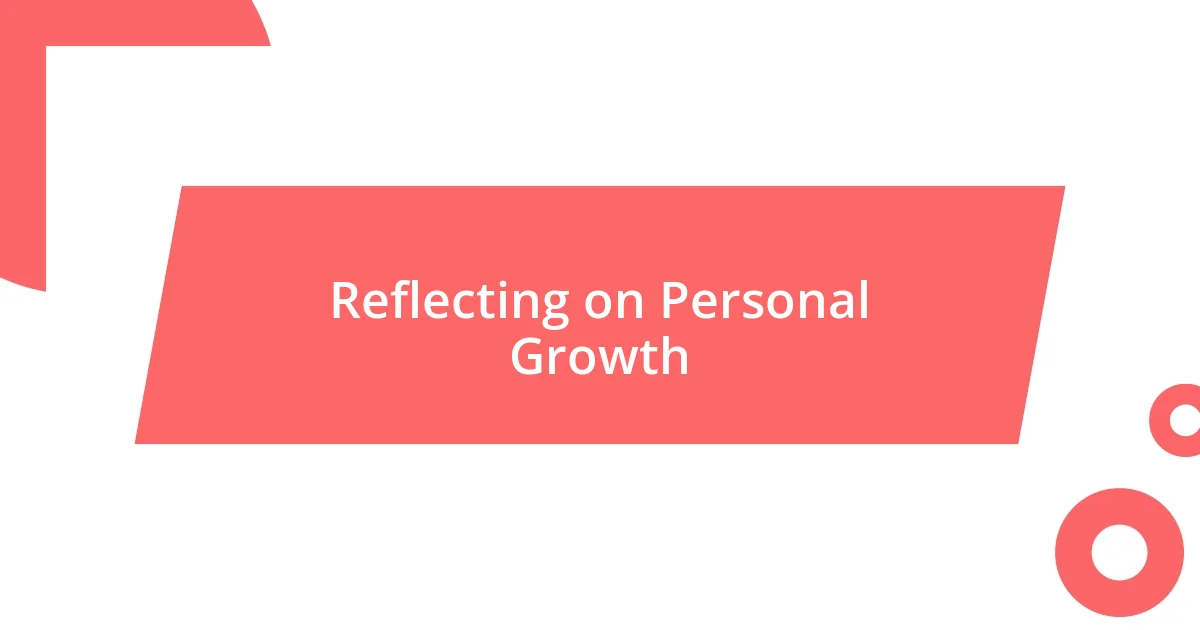
Reflecting on Personal Growth
Reflecting on personal growth is an eye-opening experience. I recall a moment when I sat alone at my desk, going through my journal entries, feeling both proud and slightly overwhelmed. Each entry reflected not just my achievements, but also my struggles, and I realized how much I’ve changed in response to those challenges. Have you ever looked back at your past and felt a whirlwind of emotions from the journey you’ve taken?
One particular instance stood out during my reflections. I remembered a networking event that initially filled me with dread. I felt like an imposter in a room full of seasoned professionals. However, looking back, I saw how that discomfort pushed me to develop my social skills dramatically. Now, I relish similar opportunities, recognizing they are stepping stones to my growth. Isn’t it fascinating how discomfort can lead to our biggest breakthroughs?
I often ask myself how far I’ve come, especially when faced with new challenges. Recently, I took on a project that seemed daunting, but the growth I experienced while navigating it taught me resilience and adaptability. It’s interesting how those patterns emerge, and I wonder: What lessons have you uncovered in your personal growth journey? Embracing these reflections allows me to appreciate not just where I am, but also the incredible evolution that brought me here.












